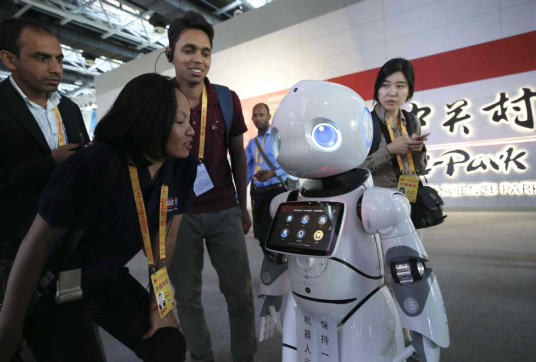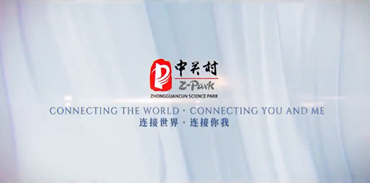Beijing proves big draw for high-end technology, manufacturing enterprises
 |
|
Foreign journalists interact with a robot at the Zhongguancun Innovation Center in Beijing on Thursday. [Photo by Chen Zebing/China Daily] |
Beijing has made significant progress in its efforts to be the center for high-end manufacturing and cutting-edge research in China, judging by the success of some leading companies in the capital city.
Commercial vehicle manufacturer Beiqi Foton Motor Co Ltd, an early entrant to the capital city, took another big step in its overseas efforts when it said it had exported 31,326 vehicles and 6,040 automobile parts during the first eight months of this year, a testimony to China's efforts to ramp up high-tech manufacturing.
By 2025, Foton plans to be a green, intelligent and high-tech global motor enterprise and the leader in China's commercial vehicle market, it said. Foton, which has 27 plants and an annual production capacity of 100,000 units per year, currently has a total production and sales volume of 8.871 million units.
Exports to overseas markets have reached 590,000 units and the company has been ranked first among Chinese commercial vehicle manufacturers for 15 consecutive years.
Since 2013, the Beijing-based automaker has been hinging its fortunes on the Belt and Road Initiative and completed more than 70 major customer projects in 34 countries and regions.
Last year, it provided services for major BRI projects like the Senegal TT Railway, Mombasa Nairobi Railway, the Pakistan KKH Highway, the largest public transportation system in Myanmar, Astana Expo, and the Association of Southeast Asian Nations. In addition, it has also established long-term cooperation and close partnerships with several BRI economies.
After a research and feasibility analysis of the African market, the company has teamed up with the China-Africa Fund for Industrial Cooperation and China-Africa Development Fund, to set up the China-Africa Investment Platform of Foton. The platform has 82.8 billion yuan ($11.6 billion) in total assets and 40,000 employees, providing high-quality products and services for 110 countries and regions.
To date, the company's 23 brands are spread over sectors like vehicle manufacturing, core component production and automobile after-sales market.
In addition, the company has invested heavily in innovation and research. Its number of authorized patents has reached more than 7,900 and also includes global innovation alliances with world-class enterprises like Daimler AG and Cummins Inc.
While Beiqi Foton is a successful example of Beijing's efforts to build a national science and technology innovation center, the city has also made considerable headway with the Zhongguancun Innovation Center, an incubator founded by the Zhongguancun Management Committee and the Haidian district Government. Nearly 15 companies involved in cutting-edge technologies are currently based in the center.
Over the past two years, Zhongguancun has been attracting several cutting-edge technology enterprises and drawn investment from hundreds of institutions. Currently, 134 companies are involved in the various stages of cutting-edge research.
On average, these companies have been set up for about three years, with total valuations of over 100 billion yuan, focusing on three major areas including information technology, biomedicine and high-end medical devices and material technology.
For example, Cambricon has developed the world's first deep learning processor architecture instruction set, while Uisee has created low-cost self-driving technology.
Gagogroup, one of the enterprises based in the Zhongguancun Innovation Center, is a big data application company that uses satellite remote sensing and meteorological big data to serve clients in agriculture, environment, finance and other industries.

